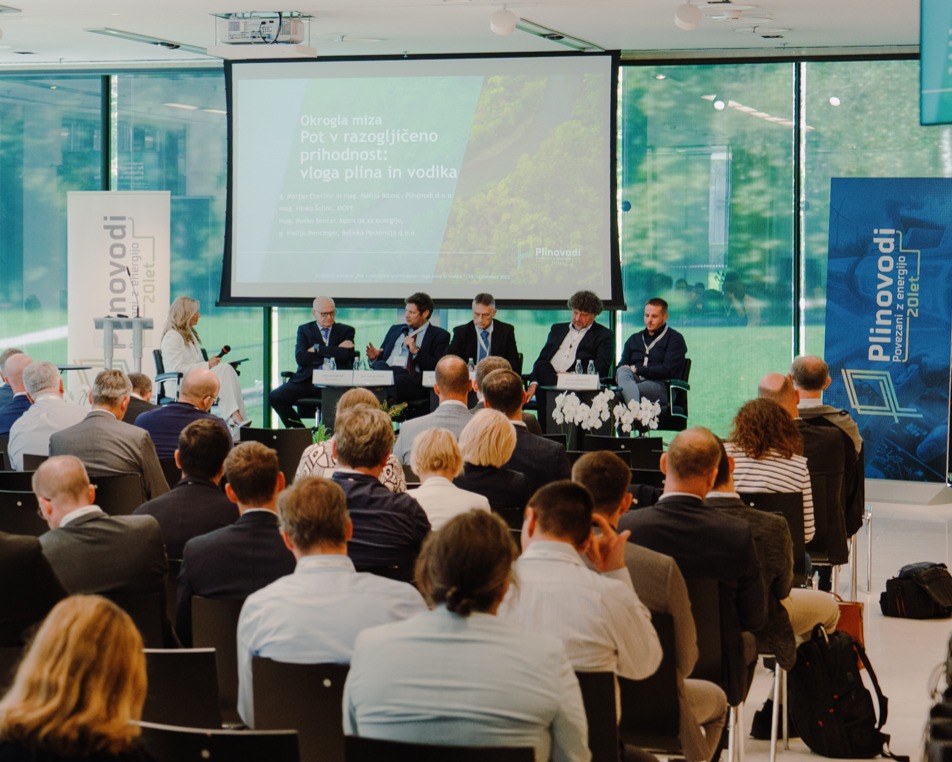
Expert Meeting: “Path to a Decarbonized Future: The Role of Gas and Hydrogen”
On 18 September 2025, Plinovodi organized its traditional expert meeting “Path to a Decarbonized Future: The Role of Gas and Hydrogen.” The first part of the event featured presentations on the state of the gas market at both EU and Slovenian level, recent legislative developments, as well as the anticipated steps in the gas market and key measures for the development of the hydrogen market. The second part included a presentation by an international expert on the hydrogen network in Germany, followed by a roundtable discussion on the topic “Path to a Decarbonized Future: The Role of Gas and Hydrogen.”

This year’s meeting was opened by the General Manager, Marjan Eberlinc, who, in his introductory address, emphasized the importance of natural gas, noting that its transmission is comparable to Slovenia’s annual electricity consumption. In 2025, Slovenia is expected to transmit as much as 10 TWh of natural gas. He particularly highlighted activities related to the upgrading of gas transmission infrastructure, namely the upgrade of the Ajdovščina compressor station, the construction of the Vrtojba border metering station, the construction of the Ajdovščina–Lucija pipeline, and the increase of bidirectional cross-border capacities with the system operated by the Croatian transmission system operator. Regarding the transition to renewable and low-carbon gases, the General Manager underlined the importance of the update of the Sustainability Strategy of Plinovodi, active involvement in the preparation of the Action Plan for Renewable Gases, and participation in the European Network of Network Operators for Hydrogen (ENNOH).
In the first presentation, Urška Gabrovšek provided an overview of regulatory changes at EU level related to the Gas and Hydrogen Market Package, gas storage, and the European Commission’s proposal to phase out imports of Russian gas. She also presented amendments concerning capacity booking, the response of system users to the questionnaire on future energy direction, and current trends in the natural gas market as reported by the media and the Energy Agency.
The following presentation by Matjaž Sušnik addressed the implementation of regulation at the national level, with a particular focus on the importance of the adoption of the ZSROVE-1 Act for gas and hydrogen, updates to the Network Code for the Gas Transmission System (SON), the Network Tariff Act, and the upcoming amendments to the Auction Rules.
In the third presentation, Marko Širovnik discussed gas transmission and the Slovenian gas market. He presented the technical characteristics of the transmission system and its utilization, as well as a comparison of transmitted quantities and gas consumption in Slovenia. He also outlined the stakeholders of the Slovenian gas market and the scope of gas trading on both the wholesale and balancing markets.
The fourth presentation focused on cybersecurity. Jan Šinigoj outlined the purpose of the Directive on measures for a high common level of cybersecurity across the Union and the key requirements arising from the Slovenian Information Security Act.
In the fifth presentation, Matej Urh summarized the role of gas and hydrogen in Slovenia’s National Energy and Climate Plan (NECP). He stressed that the role of natural gas will diminish over time, to be gradually replaced by biomethane (including synthetic methane) and hydrogen, and that gaseous fuels together with transmission and distribution infrastructure will remain crucial for achieving the objectives of the green transition.
On the occasion of Plinovodi’s 20th anniversary, the traditional expert meeting was enhanced with two distinguished guest speakers, which enriched the event considerably.
The final presentation of the first part of the event was dedicated to support schemes. Stane Merše from the Jožef Stefan Institute highlighted encouraging forecasts of hydrogen production by 2030 from the IEA report, stressing that the key challenge remains price. He noted that a new support scheme for renewable energy sources, also covering hydrogen, will soon become available.
The second part of the event was opened by guest speaker Gideon Saunders from Germany, who presented the development of the German hydrogen network. His presentation focused primarily on the financing of the new hydrogen transmission network (the so-called intertemporal cost allocation mechanism). He concluded by stressing that the development of the hydrogen market in Germany will crucially depend on the development of hydrogen markets in other EU Member States as well.
In addition to the presentations, the event also featured a roundtable discussion entitled “Path to a Decarbonized Future: The Role of Gas and Hydrogen,” moderated by Bernarda Žarn. The panel included Marjan Eberlinc, General Manager of Plinovodi; Matija Bitenc, MSc, Member of the Management Board of Plinovodi; Marko Senčar, MSc, Secretary in the Office of the Director of the Energy Agency; Hinko Šolinc, MSc, Director-General of the Energy Directorate at the Ministry of the Environment, Climate and Energy; and Matija Mencinger, Head of Production at Belinka Perkemija d.o.o. All speakers agreed that cooperation among key stakeholders is essential for the effective functioning of the gas market, and that such cooperation will be equally important in the processes of transition to renewable and low-carbon gases. The panellists also concurred that the development of the hydrogen market in Slovenia will hinge in particular on the issue of financing, in view of the anticipated hydrogen demand.
This year’s anniversary meeting brought together more than 100 participants from Slovenia, Croatia, Hungary, and Germany. We would like to extend our sincere gratitude to all participants for their attendance and active contribution to the discussions. Presentations are available via the active links, where additional information on the topics addressed can be found.
We use cookies to improve your experience and analytics. Choose how you want to proceed.